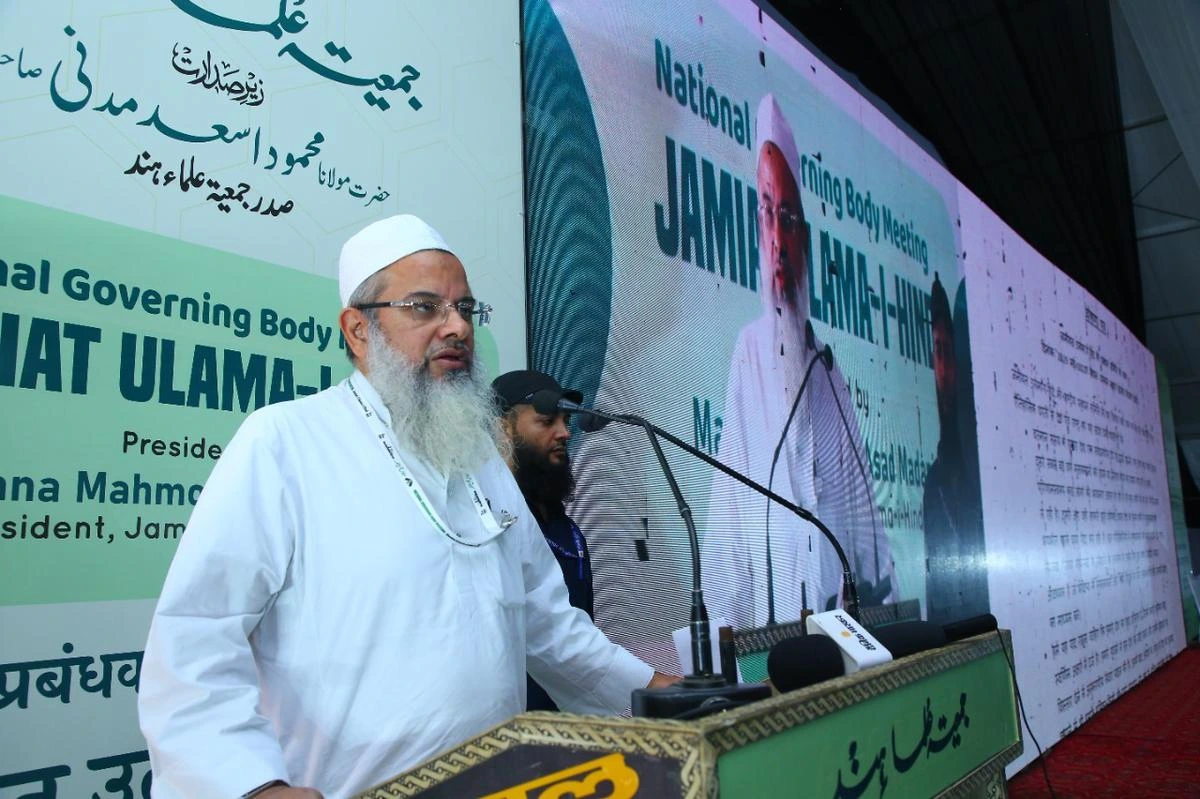05-SEP-2025, 12:00PM In a significant political and religious development, Mahmood Madani, the president of Jamiat Ulama-i-Hind, has extended support to the Rashtriya Swayamsevak Sangh (RSS) proposal for dialogue on the sensitive issues of Gyanvapi, Kashi, and Mathura. His statement, described as a constructive step toward reducing communal tensions, has sparked wide-ranging debates across India. At a time when religious disputes continue to dominate political narratives, Madani’s willingness to engage in discussions is being seen as a move that could shape future interfaith relations.
Mahmood Madani Opens Door for Dialogue
Mahmood Madani Stance on Gyanvapi and Kashi Issues
By declaring his readiness to engage, Mahmood Madani emphasized the importance of dialogue over confrontation. He stated that disputes such as those over Gyanvapi and Kashi should be addressed in a spirit of understanding rather than hostility.
Mahmood Madani : Supporting RSS’ Initiative
Interestingly, Madani’s support for the RSS proposal marks a rare moment of consensus between an Islamic cleric of national prominence and a Hindu nationalist organization. He highlighted that only through conversations can communities prevent further polarization and build mutual trust.
Mahmood Madani : Political and Religious Implications
Why Mahmood Madani : Statement Matters
As a respected Muslim leader, Mahmood Madani’s words carry significant weight. His readiness to talk about highly sensitive religious sites sends a strong message of openness, which has the potential to reduce communal tensions.
Mahmood Madani : A Turning Point for Hindu-Muslim Relations?
Analysts believe that this development could set the stage for more structured interfaith dialogues. If pursued sincerely, such initiatives may foster reconciliation between communities often divided by historical disputes.
Mahmood Madani : Historical Background of the Disputes
Mahmood Madani : Gyanvapi Case in Varanasi
The Gyanvapi mosque dispute in Varanasi has been a focal point of contention for years. Claims regarding the mosque being built over a demolished temple have fueled prolonged legal and political debates.
Kashi and Mathura Controversies
Similarly, Kashi Vishwanath Temple and the Shahi Idgah mosque in Mathura remain subjects of dispute. These cases mirror the long-standing struggle between preservation of religious identity and the quest for reconciliation.
Mahmood Madani’s Call for Constructive Engagement
A Step Toward Reducing Tensions
According to Mahmood Madani, confrontation only deepens divides. He stressed that adopting a conciliatory approach will strengthen India’s pluralistic fabric.
Dialogue as the Way Forward
By supporting dialogue, Madani has underlined that open communication can help both communities find common ground, rather than letting disputes fester into hostility.
Responses to Mahmood Madani’s Statement
Reactions from the Muslim Community
While some sections of the Muslim community welcomed Mahmood Madani’s stance as pragmatic and forward-thinking, others expressed caution, fearing that such talks might compromise their religious rights.
Political Leaders’ Take
Political leaders from across the spectrum responded differently. While some praised Madani for his statesmanship, others dismissed it as a symbolic gesture with limited practical outcomes.
Broader Role of Religious Leaders in Society
Mahmood Madani as a Bridge Builder
Throughout his career, Mahmood Madani has positioned himself as a moderate voice, seeking peaceful coexistence. His latest statement reinforces his role as a bridge between communities.
Importance of Religious Diplomacy
Experts point out that when leaders like Madani advocate dialogue, it creates opportunities for peaceful resolutions. Religious diplomacy can succeed where political negotiations often fail.
Impact on India’s Socio-Political Climate
Will This Reduce Polarization?
India’s socio-political atmosphere has been marked by increasing polarization in recent years. Mahmood Madani’s words may not provide immediate solutions but they do encourage a softer tone in public discourse.
Potential for Long-Term Understanding
If leaders from both sides seize this moment, it could lay the foundation for long-term communal harmony, setting an example for other contentious issues in the country.
Challenges Ahead
Skepticism Around Dialogue
Despite Madani’s positive intent, skeptics argue that historical disputes are too deeply rooted to be resolved through dialogue alone. Legal and political complexities continue to pose challenges.
Need for Genuine Commitment
For discussions to succeed, both communities must engage sincerely. Without a genuine willingness to compromise, even well-intentioned efforts by leaders like Mahmood Madani may not lead to lasting results.
Mahmood Madani’s Vision for India
Emphasis on Unity and Pluralism
Madani reiterated his belief that India’s strength lies in its diversity. By supporting talks on Gyanvapi, Kashi, and Mathura, he has reiterated his vision of a nation where dialogue, not division, defines the path forward.
Role of Youth and Civil Society
He also called on India’s youth and civil society to support initiatives that foster unity, reminding citizens that peace is essential for national progress.
Conclusion
The statement by Mahmood —“Ready to engage on Gyanvapi, Kashi and Mathura”—is more than just a headline. It reflects an attempt to turn heated disputes into opportunities for dialogue. By extending support to the RSS proposal, Madani has demonstrated political maturity and religious responsibility.
While challenges remain, his call for constructive engagement is a step toward reconciliation in an otherwise divided narrative. If acted upon with sincerity, Madani’s initiative could prove to be a milestone in promoting interfaith harmony and preserving the spirit of India’s pluralistic ethos.
Source : ANI





